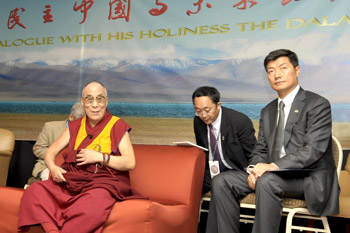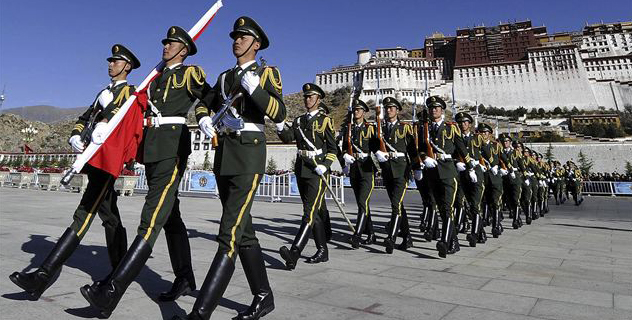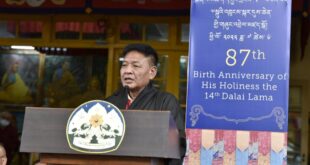Earlier this month, Beijing marked the fiftieth anniversary of establishment of the Tibet Autonomous Region with a mass spectacle in Lhasa designed to showcase its powerful grip on Tibet. Dalai Lama’s proposal for a renewed agreement on autonomy was firmly rejected at the start of the year as stealth independence. Maintaining an absolute stance of forced unity as the only option, Beijing declared Tibet’s autonomy a success. This raises two questions: First, what aspect of autonomy in contentious for Tibetans and second, why might real autonomy still remain the solution for the Sino-Tibetan relationship.
From the outset, it needs to be recognized that viewing autonomy as a legal right is misleading, as autonomy is a concept in neither international law nor constitutional law. Invariably, international norms are the metric against which a state’s claim that it has granted autonomy to its minorities is measured. Professor Hurst Hannum, a distinguished authority on autonomy and self-determination, has nominated as criteria that a fully autonomous territory possesses a locally elected legislative body, executive and judiciary with independent powers. The operating words here are “independent powers.” In China’s authoritarian system with centralized power, devolution of power to the minority governments is stifled by structural default. For central authority, which enjoys extremely broad powers, granting independent powers for regional autonomy is out of the question.

Second, the right to participate in government is provided for in China’s law and well established in international law. However, in both law and practice, China’s ethnic minorities have little opportunity to participate in government in any meaningful way. The central government’s unreasonable limiting of power to its minorities regions, including the Tibetan areas, is discriminatory in practice. This is evident in the fact that the National People’s Congress applies an additional layer of approval over legislative power in minority areas, whereas Han provincial legislatures need only report. This condition means that laws passed by minority regional governments are moot. The constitutional prescription for the Party to enforce unity kills autonomy in all its nuances. The lack of meaningful group rights in China, compounded by political discrimination and marginalization of regional governments, reduces the central authority’s claim that political rights are guaranteed to a fiction. The Party’s exercise of draconian political control over the entire state leaves little space for true self-government.
Third, the aspiration that the large majority of Tibetans have for more autonomy means final say over their lives, with no veto power by Beijing unless territorial integrity is at stake. It must be acknowledged that Tibetans are well represented in the government both at the central and local level; however, it is also true that representation without power is meaningless. In China, Tibetans as a minority account for less than 1 percent of the population, but they occupy more than one quarter of the landmass. So the key question is whether they have been given enough power to feel secure in perpetuating their values. Tibetan resistance regularly challenges the iniquities of Chinese racism; both state sponsored and societal. In his research on racial issues in China, Professor Grey Tuttle of Columbia found that racism is deeply entrenched. Since racial nationalism played a crucial role in Beijing’s consolidation of control over Tibet, the central authority’s hardline policies are an expression of deep-seated ethnic prejudices and racism at the core of contemporary Chinese society.

A principled autonomy should be case specific and appropriate to the needs of the group in the state, within the context of a complex history spanning centuries. In China’s far west, that history reveals imperial China’s subordination and incorporation of Tibet, which the Communist Party organized into the state under the Marxist-Leninist doctrine on nationality.
The treaty-like bilateral agreement in 1951 guaranteed autonomy for Tibet in the People’s Republic. Repeating the Communist Party’s tactical guarantee of Tibet’s right to secede in 1931, the 17-Point agreement was unilaterally declared void, followed by destructive policies like the Great Leap Forward and Cultural Revolution in Tibet. Irrespective of Beijing’s upending of the 17-Point Agreement, it is still the legal basis for Tibetan autonomy in China.
In recent years, there have been a spate of indications pointing to a reappraisal of China’s preferential minorities’ policies. For more than a decade, influential policy gurus in Beijing like Ma Rong and Hu Angang argued for an end to policies designed to effectively social engineer the Tibetans to become Chinese. Zhu Weiqun, China’s principal interlocutor with the Dalai Lama’s envoys, endorsed such reforms in 2012. In a politically predictable state like China, it is commonly believed that this endorsement may portend affirmative minority policies. However, it is very doubtful that this alone would wash away ethnic issues. The crux of the issue is peace and justice.
China today is a recognized power. The international political landscape is altogether different than it was at the time of the founding of the People’s Republic in 1949. No reasonable observer believes that the Tibetans pose a real threat to China’s territorial integrity. Notwithstanding the polemics that describe Tibetan self-immolators as psychotics, the state should recognize that the continuing spate of self-immolations is a cry for change. China can realize that change if it respects the right of Tibetans to remain different. For its own global image, moral standing, and legitimacy, Beijing needs to bring to a conclusion decades of negotiations on Tibetan self-determination. When the octogenarian Dalai Lama departs from the scene, neither Beijing nor the new generation Tibetan leaders will be able to rein in the specter of nationalism, which could fuel a mutually destructive conflict.
Tenzin Norgay is a Senior Fellow at the Tibet Policy Institute. He specializes in State-Minority relations and the Sino-Tibetan negotiations.


